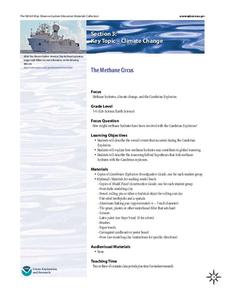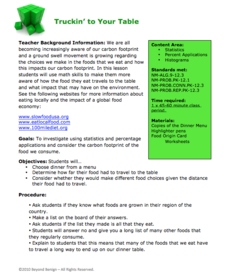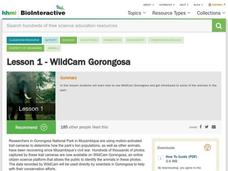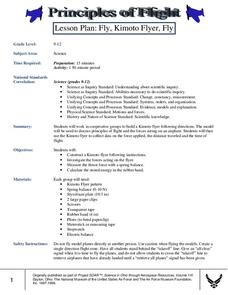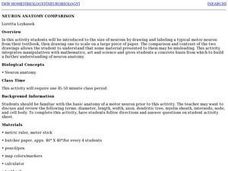Columbus City Schools
What’s Up with Matter?
Take a "conservative" approach to planning your next unit on mass and matter! What better way to answer "But where did the gas go?" than with a lab designed to promote good report writing, research skills, and detailed observation. The...
NOAA
The Methane Circus
Step right up! An engaging research-centered lesson, the third in a series of six, has young archaeologists study the amazing animals of the Cambrian explosion. Working in groups, they profile a breathtaking and odd creature and learn...
American Physiological Society
How Does the Density of a Liquid Affect the Buoyancy of an Object?
Here's a lesson plan that will really float your boat! Introduce physical science scholars to the relationship between buoyancy and density through an assortment of individual and collaborative exercises. Lab groups work together to...
Big Kid Science
Photographing the Eclipse Tips and Tricks Guide
Use a guide that provides safe ways for viewing the eclipse with a camera or telescope. The guide also includes tips and tricks for getting the best shot using a camera phone or SLR camera. You won't wanna miss this!
PBS
Stories of Painkiller Addiction: Contemplating Nature vs. Nurture
Does having an addict in your family make it more likely to become one yourself? Explore the genetic risk factors, as well as the prominent environmental influences, for substance addiction in a lesson that encourages awareness and open...
Beyond Benign
Truckin’ to Your Table
Food takes a trip to the table. Class members choose a meal from a menu and calculate the total cost of the meal including tax and tip. Using a food origin card, pupils determine how far each of the ingredients of a meal traveled to end...
Cornell University
Beam Focusing Using Lenses
Explore optics using an inquiry-based experimental approach! Young scholars use a set of materials to design and build a unit capable of focusing a beam of light. They experiment with different lenses to determine the best approach to...
Howard Hughes Medical Institute
Lesson 1: WildCam Gorongosa
Take a walk on the wild side! Episode one of an eight-part series of interactive lessons regarding Gorongosa National Park invites learners to become a part of the citizen science community. Scholars read a brief overview of the trail...
Curated OER
Measuring and Comparing Mass With a Balance
Fifth graders observe and demonstrate measuring and comparing mass using a balance. They discuss the definition of mass and the units of measurement used, observe how a balance is used, and with a partner balance the baskets of the...
Curated OER
Cruciferous Crusaders Connection
Pupils explore the agriculture of the United States. In this leafy green vegetables instructional activity, students complete an activity that requires them to identify the locations where the vegetables are grown.
Curated OER
Principles of Flight
Students explore the principles of flight. In this flight lesson, students construct a model plane and investigate the forces acting on the flier. They will measure the thrust and calculate the stored energy.
Curated OER
Distance Makes a Difference
Students create a clay model of the Sun and Earth. In this space science lesson, students explain how distance affects the appearance of objects. They write a poem or riddle about the Sun in their journal.
Curated OER
Density and Buoyancy Experimental Design
Students must plan, design, and conduct an experiment that answers the scientific question: "Come up with a question that addresses the factors (variables) of the water and its effect on whether an object floats or sinks."
Curated OER
Biomes and Regions of the United States
Students examine and identify the characteristics of the biomes of the world. Using the Internet, they compare and contrast the similarities and differences and discover how living things are supported in the biomes. They discuss how the...
Curated OER
Parachutes: What Affects a Parachute
Students create a simple paper parachute. In this parachute design lesson, students examine the effects of the wind and make napkin parachutes.
Curated OER
Warming the Earth
First graders investigate how the sun warms the Earth and examine the rotation of the Earth and the sun. They create an illustration of the sun, examine a solar system model, and listen to the book "The Sun: Our Nearest Star." They also...
Curated OER
The Sensitive Scavenger
Young scholars create multi-sensory scavenger hunt worksheet to be used on a scavenger hunt throughout the schoolyard habitat area to introduce students to concepts of biodiversity and interdependence within a habitat.
Curated OER
Develop a Hypothesis
Learners develop a hypothesis regarding the quality of a nearby body of water. They analyze locally collected data and compare it with data from different areas. They evaluate their original hypothesis as part of a larger unit.
Curated OER
Teamwork And Productivity
Students engage in a creative project of constructing different things using origami paper. The objective is for them to construct something that is identified and useful at the same time. They use guided questions to go through the...
Curated OER
Neuron Anatomy Comparison
Students create a scale model of a motor neuron that is two hundred times larger than the actual neuron. They identify the structures of a neuron and observe neurons under the microscope then use a worksheet to convert actual sizes into...
Curated OER
Predicting Plant Development
First graders investigate the basic needs of a growing plant and make predictions regarding what a seed needs in order to grow. They draw their seed predictions, listen to the book "From Seed to Plant" by Gail Gibbons, and analyze their...
Curated OER
Rain Forest Stencils
Fourth graders explore animals of the rain forest. They create a drawing of an animal in the rain forest. Students research the animal and write a paragraph about the animal. They use a stencil to create a picture of a rain forest animal.
Curated OER
Scales, Scutes, and Skins
Students identify the various adaptations of reptiles and amphibians. After distinguishing between reptiles and amphibians, students discuss the ways in which their adaptations aid in their survival. They participate in a hands on...
Curated OER
Your Own Fresh Water Aquarium in the Classroom
Students explore aquariums. In this fish and ecosystems lessons, students establish a freshwater aquarium environment using materials provided. Students read about and care for the classroom fish.
Other popular searches
- Following Directions Game
- Following Directions Trick
- Cooking Following Directions
- Following Directions Math
- Following Directions Activity
- Follow Directions Trick Quiz
- Following Directions Spring
- Listen and Follow Directions
- Following Directions Lesson
- Esl Following Directions
- Following Directions at Work
- Read and Follow Directions



